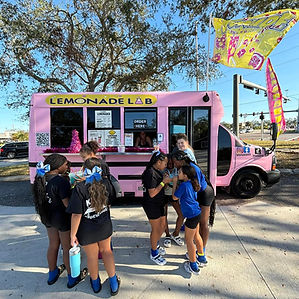St. Petersburg
Table of Contents
State
Basic Checklist to Start a Food Truck in St. Petersburg
Renew your permits annually and adhere to local zoning and operating hours regulations.
Use a licensed commissary kitchen for food storage and preparation.
Complete a Food Manager Certification Course approved by DBPR.
Obtain a Mobile Food Vending Permit from the City of St. Petersburg.
Display your Mobile Food Vending Permit and other relevant permits visibly on the truck.
Ensure compliance with Fire Safety Standards, including a fire inspection if using cooking equipment.
Pass a Health Inspection conducted by the Florida Department of Business and Professional Regulation (DBPR).

City Specific Permit Background for Food Trucks in St. Petersburg
Food trucks in St. Petersburg must obtain a Mobile Food Vending Permit from the City of St. Petersburg.
Types of Permits:
Mobile Food Vending Permit (City of St. Petersburg).
Health Permit (Florida Department of Business and Professional Regulation).
Fire Safety Inspection Permit (St. Petersburg Fire Department).
Zoning/Location Permit (if applicable).
Steps for Obtaining the Permit:
Submit a completed application for the Mobile Food Vending Permit to the City of St. Petersburg.
Complete and submit a Food Manager Certification Course as required by the Florida Department of Business and Professional Regulation (DBPR).
Pass a health inspection conducted by the DBPR, ensuring the food truck complies with food safety regulations.
Schedule and pass a fire inspection with the St. Petersburg Fire Department if your truck uses cooking equipment such as grills or fryers.
Ensure your food truck complies with local zoning regulations in the area you plan to operate.
Unique Rules/Conditions:
Food trucks must operate from a licensed commissary kitchen for food preparation and storage.
Vendors may be limited in operating in certain zones and may need special permission for high-traffic or event locations.
Food trucks must meet the zoning requirements for the areas where they plan to operate, particularly near schools or residential zones.
Cost of Business Permit
$347
How Often Business Permit needs to be Renewed
Annually
Health Requirements for Food Trucks in St. Petersburg
Inspections: Food trucks in St. Petersburg must pass an inspection by the Florida Department of Business and Professional Regulation (DBPR). The inspection covers areas like food storage, sanitation practices, and equipment cleanliness.
Food Safety Certifications: Operators must complete a Food Manager Certification Course approved by the DBPR before applying for the permit.
Truck-Specific Requirements:
A handwashing station with soap, paper towels, and warm water is required.
A waste disposal system compliant with Florida Department of Health standards.
Proof of use of a licensed commissary kitchen for food storage and preparation.
Proper refrigeration and cooking equipment that meets health codes.

Permitted Operating Hours for Food Trucks in St. Petersburg
Food trucks in St. Petersburg are generally permitted to operate from 6:00 a.m. to 2:30 a.m. in designated areas, but special event permits may allow for extended hours.
Notable Fire Requirements for Food Trucks in St. Petersburg
Food trucks that use cooking equipment (e.g., grills, deep fryers, or propane systems) must undergo a fire inspection by the St. Petersburg Fire Department.
A fire suppression system is required if the truck uses cooking equipment that poses a fire hazard.
A fire safety certificate may be required before the truck is allowed to operate.

Other Local Notes for Operating a Food Truck in St. Petersburg
Food trucks in St. Petersburg must adhere to zoning restrictions, and they are prohibited from operating near schools, daycare centers, and certain residential areas.
Vendors are encouraged to check for special event permits, which may allow extended operating hours or location flexibility.
Food trucks must comply with street parking regulations and cannot block fire hydrants or designated pedestrian walkways.
The information on this page is collected through collaboration with local food truck owners and occasional voluntary submissions from local government and health officials. Food Truck Profit is not a government agency and cannot guarantee the accuracy or completeness of this information. All food truck owners are strongly encouraged to consult directly with local government officials, including fire and health departments, to ensure compliance with all regulations. Food Truck Profit assumes no liability for errors or omissions in the content provided.

